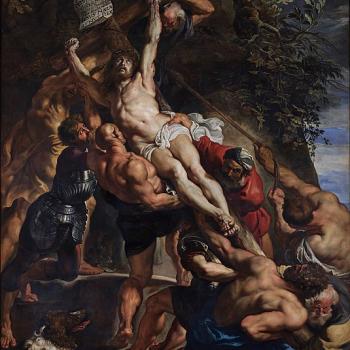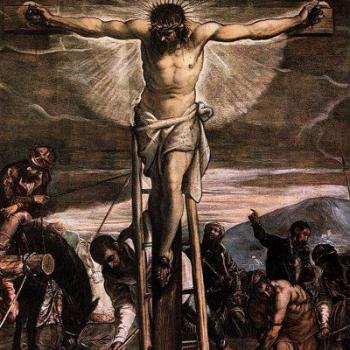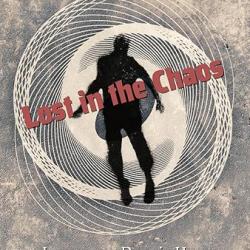Tony Woodlief at Image (an important journal on Christianity & the Arts) argues for a connection between bad Christian art and bad theology. His points are usefully specific and pointed:
I’m convinced that bad art derives, like bad literary theory, from bad theology. To know God falsely is to write and paint and sculpt and cook and dance Him falsely. Perhaps it’s not poor artistic skill that yields bad Christian art, in other words, but poor Christianity.
Consider, for example, some common sins of the Christian writer:
Neat resolution: You can find it on the shelves of your local Christian bookstore: the wayward son comes to Christ, the villain is shamed, love (which deftly avoids pre-marital sex) blossoms, and the right people praise God in the end. Perhaps best of all, we learn Why This All Happened.
Many of us are familiar, likewise, with that tendency among some Christians to view life as a sitcom, with God steadily revealing how the troubles in our lives yield more good than ill. . . .Sometimes we suffer and often we fail, and there is no clear answer why, no cosmic math that redeems, in our broken hearts, this sadness. The worst Christian novels seem to forget Oswald Chambers’s insightful observation, which is that God promises deliverance in suffering, not deliverance from suffering. And so they lie about the world and about God and about the quiet, enduring faith of our brethren in anguish.
One-dimensional characters: In many Christian novels there are only three kinds of characters: the good, the evil, and the not-so-evil ones who are about to get themselves saved. And perhaps this saved/not saved dichotomy—more a product of American evangelicalism than Christian orthodoxy—accounts for the problem.
I think we might craft better characters if we accept that every one of us is journeying the path between heaven and hell, and losing his way, and rushing headlong one direction before abruptly changing course to dash in the other, and hearing rumors about what lies ahead, and hoping and dreading in his heart what lies each way, and grabbing hold of someone by the arm or by the hair and dragging, sometimes from love and sometimes from hate and sometimes from both.
Sentimentality: Like pornography, sentimentality corrupts the sight and the soul, because it is passion unearned. Whether it is Xerxes weeping at the morality of his unknown minions assembled at the Hellespont, or me being tempted to well up as the protagonist in Facing the Giants grips his Bible and whimpers in a glen, the rightful rejoinder is the same: you didn’t earn this emotion.
Dietrich Bonhoeffer’s warning against cheap grace comes to mind, a recognition that our redemption was bought with a price, as redemption always is. The writer who gives us sentimentality is akin to the painter Thomas Kinkade, who explicitly aims to paint the world without the Fall, which is not really the world at all, but a cheap, maudlin, knock-off of the world, a world without suffering and desperate faith and Christ Himself, which is not really a world worth painting, or writing about, or redeeming.
Cleanliness: I confess that the best way to deter me from watching a movie is to tell me it’s “wholesome.” This is because that word applied to art is a lie on its face, because insofar as art is stripped of the world’s sin and suffering it is not really whole at all.
This seems to be a failing—on the part of artist and consumer alike—in what my Orthodox friends call theosis, or walk, as my evangelical friends say. In short, if Christian novels and movies and blogs and speeches must be stripped of profanity and sensuality and critical questions, all for the sake of sparing us scandal, then we have to wonder what has happened that such a wide swath of Christendom has failed to graduate from milk to meat.
And if we remember that theology is the knowing of God, we have to ask in turn why so many Christians know God so weakly that they need such wholesomeness in order for their faith to be preserved.
This, finally, is what especially worries me, that bad Christian art is a problem of demand rather than supply. What if a reinvigorated Church were to embed genuine faith in the artist’s psyche and soul, such that he need no longer wear it on his sleeve, such that he bear to see and tell the world in its brokenness and beauty? Would Christian audiences embrace or despise the result?
HT: Stewart Lundy
Life as a sitcom! Good guys vs. bad guys, and we are the good guys! Tear-jerking sentimentality! Positive messages! Of course, these are also features of pop culture entertainment. Could it be that pop culture is influencing contemporary Christianity, which, in turn, is trying to turn out its own versions of pop culture?
The actual heritage of Christianity in the arts is in the realm of high culture; that is, the creation of serious, complex, creative-rather-than-conventional works of art. Christianity has produced Dante, Spenser, Milton, Rembrandt, Bach, Donne; also wildly creative innovators such as Herbert, Hopkins, Eliot, and Rouault. Even the seemingly less-sophisticated Christian author John Bunyan wrote a rich, complex masterpiece that falls into none of the above traps. And these are just some explicitly theological writers. Christianity has also profoundly shaped the works of authors and artists who specialized in seemingly “secular” works, such as Chaucer, Shakespeare, Swift, Coleridge, and on and on, including modern authors such as Graham Greene, Evelyn Waugh, Flannery O’Connor, John Updike, and more. There are even great Christian movies–have any of you seen the works of the Danish filmmaker Carl Dreyer?–but they too are complicated, like Christianity and like life. I suspect that there are indeed Christian artists trying to emulate these kinds of artists, but will other Christians support them and become their patrons?
















